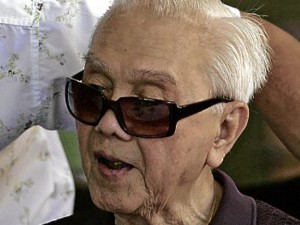
Manong Tony was a visionary who transformed “this once primitive piece of earth into something alive and verdant.”
TAGUM CITY—He was credited for transforming the once sleepy province of forest-covered Davao del Norte into what it is today, an agro-industrial area that has become one of Mindanao’s economic boom.
Don Antonio Floirendo Sr., a former auto salesman, was the force behind the Tagum Agricultural Development Corp. (Tadeco), a major player in the country’s banana industry.
A mining engineering graduate from a university in Manila, Floirendo ventured to Mindanao as a pioneer after World War II and ended up selling vehicle parts for Ford Motors Corp. in Davao.
He founded the Davao Motor Sales (Damosa) in Barangay Lanang here.
His first foray into agri-business came during the abaca boom in the early ’50s, but when the market for the Manila hemp hurtled, Don Antonio set his sight to the bourgeoning craving for banana in the international market.
“I recall the first time he set foot to survey this piece of territory; I was tagging along with him as his waterboy,” says Davao del Norte Gov. Rodolfo del Rosario, younger sister to Doña Nenita, Floirendo’s wife.
“I was 15 then. This whole (Tadeco) area was a virgin forest, a jungle full of monkeys, wild boars and leeches.”
Today, Tadeco has over 10,000 hectares planted to exportable Cavendish banana in the towns of Dujali and Sto. Tomas, and parts of Panabo City. A large portion of that landholding is part of the former Davao Penal Colony (Dapecol) reservation area leased to Tadeco.
“He had lived a very good life. He was a pioneer in Mindanao and an icon in banana industry. We’re saddened by his passing,” says former Las Piñas Rep. Cynthia Villar during her visit here last Sunday as guest for the province’s 45th founding anniversary.
Floirendo died of pneumonia at St. Luke’s Hospital in Taguig City last Friday. He was 96.
Local officials and ordinary people alike flocked by the hundreds as the body of the man dubbed as the country’s ‘’Banana King” was flown to Davao and brought to the St. Antonio de Padua Chapel in A.O Floirendo village, in Panabo City last Monday.
“We were saddened upon learning about Don Antonio’s death. What we lost was not just a good person, but also an icon,” says Compostela Valley Gov. Arturo Uy.
For Gov. Del Rosario, Davao del Norte’s grand old man was “a father to me when I was a young boy; a brother in later years, and a close friend in our twilight years. He had left an unfilled longing in my heart, as if a piece in me also dies.”
Don Antonio is survived by his wife Nenita and their six children. His second son and namesake, Antonio “Tonyboy” Jr. is a former representative in the province’s 2nd district, while the youngest, Vicente, is a member of the provincial board representing the Davao del Norte federation of barangay captains.
According to Del Rosario, his Manong Tony was a visionary who transformed “this once primitive piece of earth into something alive and verdant.”
Aside from agribusiness, Don Floirendo also founded Antonio Floirendo Corporation or Anflocor, a Mindanao-based conglomerate which has interests in real estate, port operations, trucking and fruit packing.
Don Antonio was buried at the family’s landholding in Marapangi village, in Davao City’s Toril district, after a Mass in Panabo City last Friday.
The Marapangi property is the site of Nenita Farms, one of the first agribusiness ventures of the Ilocano industrialist.

